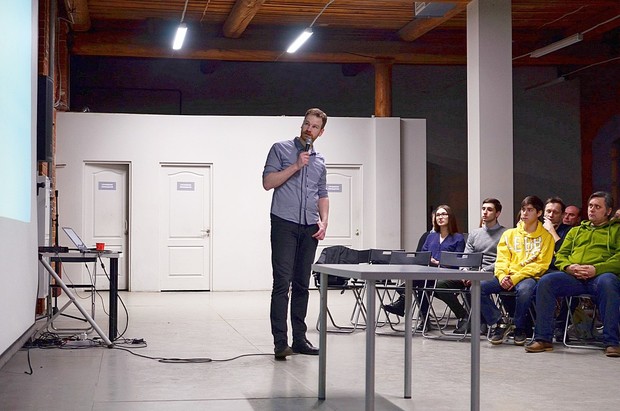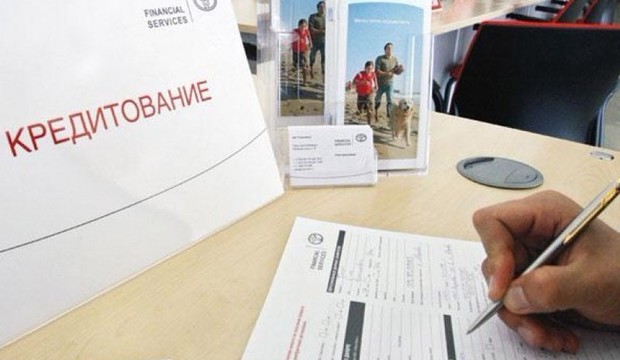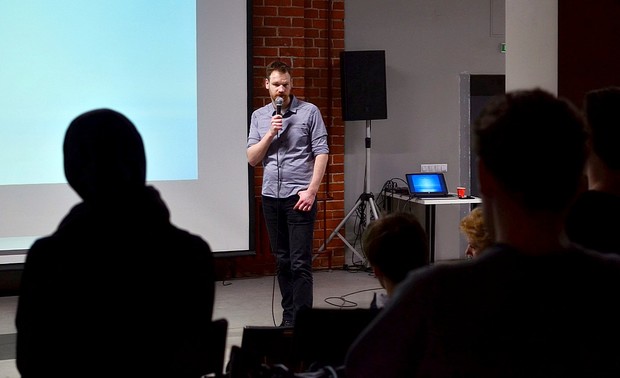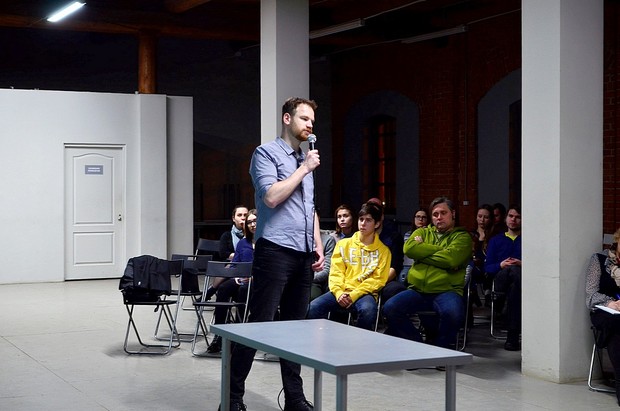''We expected that people would say ‘’loan is a great thing’’ but estimation of loan is negative instead''
The transcript of the lecture of Professor of the Moscow Higher School of Social and Economic Sciences Grigory Yudin in the contemporary culture centre Smena. Part 2
In the second part of the transcript of the lecture of Philosopher and Sociologist Grigory Yudin in Kazan, which took place last weekend, he answers questions from the audience and discusses the role that consumer lending plays in the desire of a person to overcome the huge gap between rich and poor.
''We are dealing with a sharp decline in civic participation in Russia''
Now let's make a sharp turn and ask ourselves: what does it say about ourselves and about how we are organised. Let's assume for a moment that all of these trends I have mentioned are in a completely different world, in relation to which we hold a catch-up or lagging position, and suddenly to these trends we have a direct and immediate relation. Then all those considerations, which I have suggested, can be not so far from our own lives.
I'll try to split my observations on this issue in three blocks and to illustrate by their example the studies, which I do myself. I'll begin with a political side of the issue. You remember that where we were pursued by the Soviet person we talked about the fact that the political organisation in modern Russia resembles the Soviet model — in the sense that we have the unanimous support of the government and a quasi-totalitarian situation, the situation of total suppression of an individual by the state.
Just as it happens around the world, in Russia we are dealing with a sharp decline in civic participation. This is a problem about which different countries write and it is happening where they were most proud of civic participation from the bottom — in the United States. About that people are expressing indifference to civil activity, they are less interested in managing the community, city and environment, to do something actively. They are less willing to communicate with politicians, they are less likely to participate in political campaigns, rarely communicate with their representatives, less interested in elections. Around the world, there is a process of depoliticization. It's just a loss of interest in politics, which is reflected in the decline in civic participation. Instead, politics has been transferred in an economic category, this is what we have in Russia. We are conducting a survey about which I can't tell because it is unfinished, we are surprised at how often we are told (we talk to people that collect data for public opinion polls) that the most difficult topic for polls is politics.

People are trying to withdraw into private life, trying to solve their own problems, it is more understandable, practical and accessible for them than participation in political life
People are more willing to talk about money, people will not directly tell how much they earn, but the fact that politics is so problematic topic has surprised us. They say that when there is a poll about politics, they try to throw it, take something else, anything, just not a poll about politics, people don't like it. In this sense, there is a transfer — one should manage who best understands the economy, who is a strong manager, a model that is strong. In parallel with this, in Russia (it is not just Russian situation), the models of local government are weak. Now the State Duma is considering a draft law that can destroy local self-government — it is the law on the unification of cities in urban okrugs. We know that local government is the weakest part of the Russian political system, people are not ready to participate, they are not prepared to manage, to vote or control. It seems to them strange activities that don't make sense. This is due to the policy of repression of collective activity, which quite clearly is reflected in Russia and in other countries, when we hear that decisions should be taken not by ordinary citizens who do not have a clue but people who know how things work. Decisions should be taken by those who are competent, people with special education and experience. But any spontaneous activity from below is unfavourable and leads to bad consequences and must be suppressed. It ends with the most vivid indicator — low voter turnout. What was our turnout at the last local elections?
Audience: We have always had a high turnout.
Yudin: Great, it will be an example that will work against my theory, and this is a good counterexample. But, in fact, in Russia, the turnout is very low and continues to decline at the federal elections, as well as at local ones. There is a struggle for a record, but in big cities, a turnout of 5-12% is not considered something out of the ordinary. It should be borne in mind that the proportion of those who participate in the polls is also very low — you will not hear about it on the evening news, but the share of those who answer surveys, depending on the method, is 10-30%, not more. That is, we can say nothing about the others, they don't want it, they are not interested.
It slightly resembles the idea of paternalistic nature of this power. We are not dealing with a reluctance to support authorities or to protest against it but rather with a desire to distance themselves from it in general. People are trying to withdraw into private life, trying to solve their own problems, it is more understandable, practical and accessible for them than participation in political life. It doesn't resemble a paternalistic model.
''Russia is a country with a near-record inequality, there are 10% of rich people who own 90% of wealth''
Let's proceed to the second component. The second component is inequality. I have shown the image of inequality for the whole world. According to the Swiss Bank, Russia is a country with practically record inequality, there are 10% of rich people who own 90% of the wealth. This, of course, affects 90% of the population that fall into this 10%. How does this affect? Russia is a country with large gaps between cities and rural areas, between the capital and the regions. However, few people live on the balloon, therefore, consumer power is slowly going down. People see how they could live, and they begin having the appetite of consumers. How can they be implemented in a situation where the gap between rich and poor is very high? A natural way that is used here is consumer lending, which grew very fast until 2015, in 2016 the trends changed a bit. When we were studying consumer lending, we faced with the fact that there are so many different estimates of how many people have consumer loans and how to count it, and how to deal with. We were at first surprised by this dispersion, I formulated it, some say it is 30%, others — 90%. It's weird when all of these sources are serious. When we started to do the research ourselves, we understood that it was not very simple. I'm going to talk about the interview that we did with the borrowers, I have often had cases when within an hour we were talking to a man, he tells you that he has never had a credit, that he hates them, and then, suddenly, it turns out that he uses the card long gone into overdraft and he has a giant debt. From the point of view of finance, of course, it is a credit behaviour.

People often take loans to ensure that at that the moment they feel free and independent
So the question is how to count, and this is a trivial question. Until recently the situation with the loans was deteriorating, debts were growing. The problem was not that Russia had a lot of debts. The problem was that in Russia there remains relatively poor credit quality. This means that the most vulnerable, from their point of view, are those who earn the least. Those who have a small income, they have a large load, which may amount to 70-80% of household income on a monthly basis. These people often have two or three loans, and for them it is critical. The distribution of credit loads causes concern of the Central Bank. We saw one of these outbursts of the problem when last year there were protests of foreign currency borrowers.
How is it usually explained from the point of view of the concept of the Soviet person? It is assumed that the Soviet person has no sense of responsibility, that is why he will take loans not thinking about the consequences. This is what makes people take loans without thinking about where it leads. With this assumption, we started the study, which was done in 2014-2015, where we took in-depth interviews with borrowers. We had eight cities in the study, we took 106 interviews. I can tell you that the initial hypothesis that we originally had has not been confirmed. We expected that people would say ''loans – it is a great thing, no need to pay, it will resolve itself''. On the contrary, the rating of the loan is negative and few people rarely said that they gladly took loans, this was usually done out of necessity. A loan is a big trap that should be used only as a last resort.
But more interesting is that people who have a loan experience profess the principle of personal independence and autonomy. This is a very interesting thing because we expected that their principle would be ''the government owe to us, so we will take what we want''. We heard the opposite: ''You are always responsible for what you do and most importantly — do not be in debt''. This, of course, is surprising, especially if you're talking to a person who is in deep credit pit, when he tells you that he has always followed the principle never get in a personal relationship, it sounds kind of weird. But the solution to this paradox is quite simple. Between a loan that we take from friends or relatives and a bank loan there is a very important difference. It is that you pay a bank for each minute of time of using a loan. It is not grace that we have received, you pay it from your own pocket. I do not get into a dependency on a bank. That is why people are not inclined to borrow from friends and relatives, they tend to borrow from banks. And banks, by the way, know about it. Maybe some of you have seen — one of the most beautiful commercials I've seen appealed to those who already has a loan and it was about not to go and beg from friends and relatives, and just come and refinance at the best rate.
Another principle that has amazed me is called the principle of prudence. We expected to find people that don't especially think over the following loan: what's the difference — a hundred thousand or a hundred and fifty, but we found that the ruling principle, including among those who are in deep debt, is the principle of prudence. It's an amazing feeling when you're talking to a person who has several credits and he refinances and understands that he is going under the ice, and he says that anyone who cannot pay for the loan — he is to blame himself. This will never happen to him, he said. But he has just recently said that he has not liquidated a loan. At the same time, this person can be fully confident that he has a plan to get out of this situation, that he has a reliable recipe for the situation to resolve. That is why all these people sit there with a pen and paper and carefully consider all of their expenses and income, regardless of how bad their credit situation can be. The cases where people take out a loan just because they wanted to and they had no time to count are very few, this is a special category.
Finally, another principle, which I call the principle of monetization of communications. Often loans are a way to avoid difficult conversations. Here are a couple of typical examples: for example, a woman wants to buy a washing machine, she spends a lot of time to do laundry. She tells her husband about it. He says — you can do without it. She gets angry. And then she says to herself that she is an independent person. Yes, I earn not enough, but I'll take a loan and then I will not waste time on it. She takes a loan, buys a car with the intention then to pay for it, it ends up with a family scandal. Further scenarios may be different.
I'll skip one more story, although it is quite interesting. I'll just say that people often take out loans — despite the fact that this is a calculated decision in order at the moment to feel free and independent.

In my opinion, Tyutchev spoke about the fact that Russia exists to show the world how people should not live. Maybe something similar is happening now
''If there is something we can say about the late Soviet person, it is that his natural environment is a manipulated collectivity''
In conclusion, let's ask ourselves the question that I promised at the beginning. What is here from the Soviet person and what is post-Soviet? I hope that if I have not shown but at least I have given an idea of what is happening in Russia is fairly typical for those countries on which Russia is often focused, and these problems are not unique, they are not the problems of backwardness, underdevelopment, or that we have some special cultural code. Moreover, many of them in Russia are much more sharply expressed than in other societies.
We were to find out what have appeared in the last 25 years and that is a trace of Soviet subjectivity. This raises a couple of problems. The first is that we know little about the Soviet person. It should not be surprising because, in the dominant model, it is not for exploring, but in order to explain why something is not working. It is like a pest that comes and constantly cuts the wire. No one is interested why it is arranged this or that way, how it can be informatively explained why this subjectivity is complex. It is rather a functional place in order to explain why mainstream ideas do not work, they need to be saved somehow. It's a big research agenda. A couple of good books have recently been released — the most famous of them is by Alexey Yurchak It was forever until the end. This is a good though controversial description of the late Soviet times. But, in principle, we know little about it because we never asked this question seriously.
The second problem is that no single Soviet person ever existed, it was a kind of rhetorical construction, which is confusing. Over 70 years of Soviet power, there were several different anthropological solutions. Why the approach that I offer you is strong? It is strong because it doesn't proceed from the fact that there are people who inhabit the area, and then they may or may not learn something. On the contrary, the idea is that a certain anthropological type corresponds to the regime that it inhabits and vice versa. In this sense, if the control method changes, those whom we manage also change. If you those whom we govern change and the method of administration also changes. A person is the variable. In the Soviet system, changes also occurred that changed the Soviet person.
If there is something we can say about the late Soviet person it is that his natural environment is manipulated collectivity. This rhetoric of collectivity, belonging to large groups, which really were not based on a real collective experience. That is why there are so many sources of this time writing that this was a very ambiguous collectivity that was never true and at the same time creating multiple modes of existence. It existed on the background of the absence of civil structures, the lack of any real lower union, the formation of collectives at the bottom. In these conditions, we have the changes that have brought us to a state that has been described during the lecture. I call it the combination of the late Soviet organisation with the post-Soviet organisation. This simulated collectivity of the late Soviet times combines with the post-Soviet time, when we enter into a completely different logic when the criterion for success is entirely different, competition is encouraged, individual success, civic associations and collectivity are not encouraged. The result is a strange synthesis that makes us exceptional, so there is interest in what Russia is today. It is not excluded that Russia is not some a backward pedestrian in this general way but it most radically embodies the trends that were peculiar to Western Europe and North America. Just here there are no limits to these tendencies, and they manifest themselves much more sharply and clearly. In my opinion, Tyutchev spoke about the fact that Russia exists to show the world how people should not live. Maybe, something similar is happening now.
This makes us answer the question what to expect next a different way. What will be the result of the extension of the grey area, about which I have spoken today — zone of people who are not interested in politics, who are out of the political field. As we know by the example of many countries over the last few years, such people tend to emerge from the shadows and dramatically change the situation. Nobody knows how it can happen in Russia, but in order to figure this out — we definitely have to change the tool. The main question that we will have to answer soon — what tool is needed to see this grey zone and to find out something about ourselves.

If there is something we can say about the late Soviet person it is that his natural environment is manipulated collectivity. This rhetoric of collectivity, belonging to large groups, which really were not based on a real collective experience
Audience: My question is about the level of political participation of Russia in the world – it is low. Isn't the situation reverse in the West? If we take the election of Trump and Brexit, it turns out that the polls predicted one thing, but, in fact, it turned out differently. I don't think that there were big mistakes when making surveys, but it turns out, Trump's supporters and supporters of the British exit from the EU came more massively than their competitors. It is their internal necessity or they were just properly mobilised?
Yudin: I can easily answer this question on the example of the American elections. There are two major outcomes of these elections, and they do not come down to the fact that Trump won. This election had a very low turnout of the population — 52%. Imagine elections that decide the fate of America, where a crazy person may appear, previous year I spent in America and I know many people think he's crazy. At the decisive elections, half of the population ignores it. This is not a record level, but it is a very low turnout. About the second half I can say that never before in the American there have been two candidates with such poor ratings. People who went to vote, they did not vote for them but they voted against the other. Both of the candidates had a record negative ratings. At the exit from polling stations, 65% of respondents said they fear a President Trump. I would like to draw attention that was purely a protest vote. America today is characterised by aversion to politics. Almost all presidential candidates, except for Hillary Clinton since the early stages, people said that they are not politicians — it's ridiculous. For forty years they were in the Congress and say that they were not politicians.
As for surveys, there is more or less clear explanation why surveys turned out to be inaccurate. It is that people who do not want to participate in politics do not tend to answer questions. But, at some moment, they get mobilised and come to vote. Those who know peculiarities of the American voting system, they know that president is not elected by a national voting and in Trump's case, the victory advantage in 2-3 key states helped him. Here the turnout was a little more – a little more angry people who were furious about the opposite candidate prevailed. It should be a lesson for us, we should understand that a standard method that we use show only what the reality wants to show us. What it doesn't want to show – we won't see with these methods.